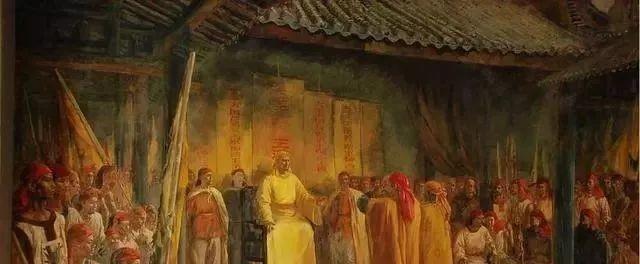There are two things that cannot be touched by the ancient Chinese dynasties and dynasties, one is to interfere in the abolition of the prince, and the other is to rebel. Both of these points are directly related to the ruling foundation of a dynasty, so once convicted, the above two acts can be blamed on the head or the nine tribes. Just as the Taiping Rebellion broke out in the last years of the Qing Dynasty, although the Taiping Heavenly Kingdom had a certain "pyramid scheme color", Hong Xiuquan used the slogan of "anti-Qing" to fool many poor people to follow, but at that time, the Taiping Army was indeed on the opposite side of the Qing Dynasty, and the people also regarded it as the greatest hope for overthrowing the decadent rule of the Manchu Qing.

However, rebellion is rebellion. According to historical records, all the generals of the Taiping Army who were caught were basically executed by Ling Chi, and those major generals were specially escorted back to Beijing to public Ling Chi. Every time the Qing army attacked an important town of the Taiping Army, most of them would directly slaughter the city. For example, in 1863, when Li Hongzhang's Huai army attacked Suzhou, it first tried to persuade the eight kings of Suzhou to surrender, and offered favorable conditions. Li Hongzhang, believing himself to be a major minister of the Qing Dynasty, held power in his hands, and specially pulled foreigners to testify. For the price tag set by Li Hongzhang, the history books record that "to give Yun guan and other two-pin military positions, gong (Cheng Xueqi) and oath, Gordon to prove it, Yun guanyi is not doubtful", that is to say, the Huai army side made a guarantee, to the surrender of the eight kings of Suzhou high-ranking official Houlu, it took a lot of trouble to make the Taiping army side convinced.
But after the Qing army entered the city, it immediately tore its face. The Qing army arrested all the taiping generals, escorted them to Beijing Lingchi, and slaughtered all about 70,000 taiping troops in Suzhou. At that time, the scene was so tragic that even the foreigners who were fighting the rebellion together could not watch it. However, such extremely harsh cases abounded, after the defeat of the Taiping Heavenly Kingdom Northern Expedition, the main generals Li Kaifang, Lin Fengxiang and a number of Taiping Army generals were all killed; the Tianjing City was broken, more than 10,000 female soldiers resisted, and finally all were slaughtered; the wing king Shi Dakai was cornered on the Dadu River and surrendered to the Qing army, in exchange for his own life in exchange for the personal safety of his subordinates, but he was delayed by Ling for thousands of knives before he lost his breath, more than 2,000 of his soldiers were slaughtered on the spot, the river was directly stained red, and the river surface was full of corpses.
In the process of counterinsurgency, the qing army basically killed all the way, and all those who caught some official positions in the Taiping Army were basically delayed. Logically, the purpose of the Taiping Army's uprising was to oppose the Qing, and the Qing Dynasty's methods of treating them were enough to cause hatred, so how did the Taiping Army "retaliate"?
As early as March 1853, when Lin Fengxiang, Li Kaifang, and Ji Wenyuan led more than 20,000 Taiping troops in the Northern Expedition, they clearly stipulated that all those who captured the Qing army should be divided into "Manchus" and "Han Chinese". The Manchus and those who worked for the Manchus were killed on the spot after they were caught, without mercy; and the Han who surrendered, if they did not do too much evil, could be reinstated after surrender and paid a good salary. If they are not willing to follow the Taiping Army, they can also be released. At that time, the morale of the Taiping army was high, and it marched north from Tianjing (present-day Nanjing), successively capturing Anhui, Henan, and Zhili, and the soldiers pointed directly at Tianjin and Beijing. In the process, the Taiping Army captured a large number of Qing troops and disposed of them accordingly. This also became the standard for the Taiping Heavenly Kingdom to deal with Qing prisoners later.
Of course, this set of standards of the Taiping Army also has a certain purpose of "buying people's hearts." However, just as there was no wind or waves, the Taiping Heavenly Kingdom did capture the hearts of the people for a certain period of time, occupying half of China in a row, making the decadent rule of the Manchu Qing Dynasty precarious. However, the extravagance of the later period also made its previous achievements abandoned. In contrast, Li Hongzhang, Zeng Guofan and others are Han Chinese, but they can't bear to kill their compatriots, and when the two are compared, it is inevitable that people will not sigh.